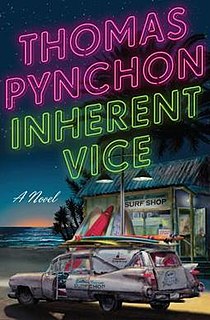
East Windsor is a town in Hartford County, Connecticut, United States. The population was 11,162 at the 2010 census. The town has five villages: Broad Brook, Melrose, Scantic, Warehouse Point and Windsorville.

The Crying of Lot 49 is a novel by Thomas Pynchon, first published in 1966. The shortest of Pynchon's novels, it follows a woman, Oedipa Maas, possibly unearthing the centuries-old conflict between two mail distribution companies, Thurn und Taxis and the Trystero. The former actually existed (1806–67) and was the first private firm to distribute postal mail; the latter is Pynchon's invention. The novel is often classified as a notable example of postmodern fiction. Time included the novel in its "TIME 100 Best English-language Novels from 1923 to 2005".

V. is the debut novel of Thomas Pynchon, published in 1963. It describes the exploits of a discharged U.S. Navy sailor named Benny Profane, his reconnection in New York with a group of pseudo-bohemian artists and hangers-on known as the Whole Sick Crew, and the quest of an aging traveler named Herbert Stencil to identify and locate the mysterious entity he knows only as "V." It was nominated for a National Book Award.

The Pioneer Valley is the colloquial and promotional name for the portion of the Connecticut River Valley that is in Massachusetts in the United States. It is generally taken to comprise the three counties of Hampden, Hampshire, and Franklin. The lower Pioneer Valley corresponds to the Springfield, Massachusetts metropolitan area, the region's urban center, and the seat of Hampden County. The upper Pioneer Valley region includes the smaller cities of Northampton and Greenfield, the county seats of Hampshire and Franklin counties.

Gravity's Rainbow is a 1973 novel by American writer Thomas Pynchon.
Hysterical realism, also called recherché postmodernism, is a term coined in 2000 by English critic James Wood to describe what he sees as a literary genre typified by a strong contrast between elaborately absurd prose, plotting, or characterization, on the one hand, and careful, detailed investigations of real, specific social phenomena on the other.
Jules Siegel was a writer and graphic designer whose work appeared over the years in Playboy, Best American Short Stories, Library of America's Writing Los Angeles, and many other publications. He occasionally contributed book reviews to the San Francisco Chronicle, and he administered newsroom-l, an email discussion list for journalists. He died suddenly, of a heart attack, at age 77.

Richard George Fariña was an American folksinger, songwriter, poet and novelist.
Edward Mendelson is a professor of English and Comparative Literature and the Lionel Trilling Professor in the Humanities at Columbia University. He is the literary executor of the Estate of W. H. Auden and the author or editor of several books about Auden's work, including Early Auden (1981) and Later Auden (1999). He is also the author of The Things That Matter: What Seven Classic Novels Have to Say About the Stages of Life (2006), about nineteenth- and twentieth-century novels, and Moral Agents: Eight Twentieth-Century American Writers (2015).

Against the Day is a 2006 historical novel by Thomas Pynchon. The narrative takes place between the 1893 Chicago World's Fair and the time immediately following World War I and features more than a hundred characters spread across the United States, Europe, Mexico, Central Asia, and "one or two places not strictly speaking on the map at all," according to the book jacket blurb written by Pynchon. Like its predecessors, Against the Day is an example of historiographic metafiction or metahistorical romance. At 1,085 pages it is the longest of Pynchon's novels to date.
McClintic is a surname. Notable people with the surname include:
Pinchon is a French surname. Notable people with the surname include:

Inherent Vice is a novel by American author Thomas Pynchon, originally published in August 2009. A darkly comic detective novel set in 1970s California, the plot follows sleuth Larry "Doc" Sportello whose ex-girlfriend asks him to investigate a scheme involving a prominent land developer. Themes of drug culture and counterculture are prominently featured. Critical reception was largely positive, with reviewers describing Inherent Vice as one of Pynchon's more accessible works. The novel was adapted into a 2014 film of the same name.

Springfield has been a civil parish of the Borough of Chelmsford, Essex, England since 1907. The parish takes in the portion of the town north of river Chelmer and west of the A12 bypass and originally comprised the manors of Springfield Hall, Springfield Barnes, Cuton Hall, and in part New Hall.
jack green is the pseudonym of Christopher Carlisle Reid, an American literary critic who was a great defender of the work of William Gaddis. Reid—who took the name from a racing form after he quit his job to become a freelance critic—particularly admired Gaddis' 1955 novel The Recognitions, which flopped upon being published. Reid/green believed that the commercial failure of the hardcover edition of Gaddis' novel was the result of it having been panned by literary critics. Reid/green's faith in Gaddis was borne out when The Recognitions was chosen as one of TIME magazine's 100 best novels from 1923 to 2005.
Chastain is a French surname. Notable people with the surname include:
This page is based on this
Wikipedia article Text is available under the
CC BY-SA 4.0 license; additional terms may apply.
Images, videos and audio are available under their respective licenses.










